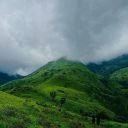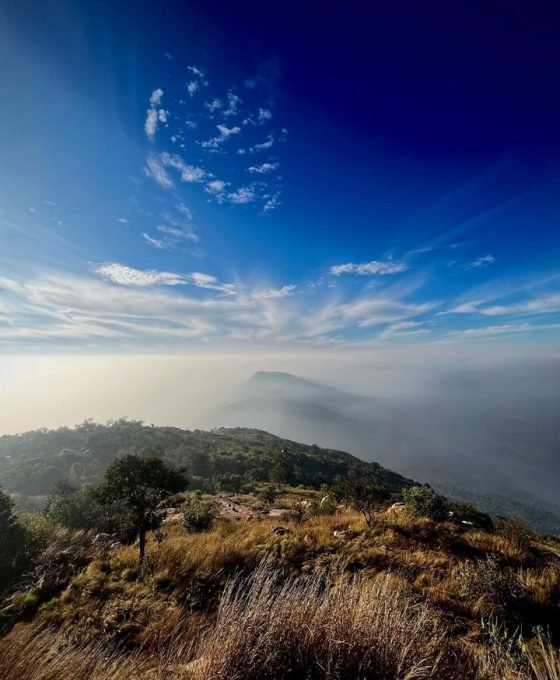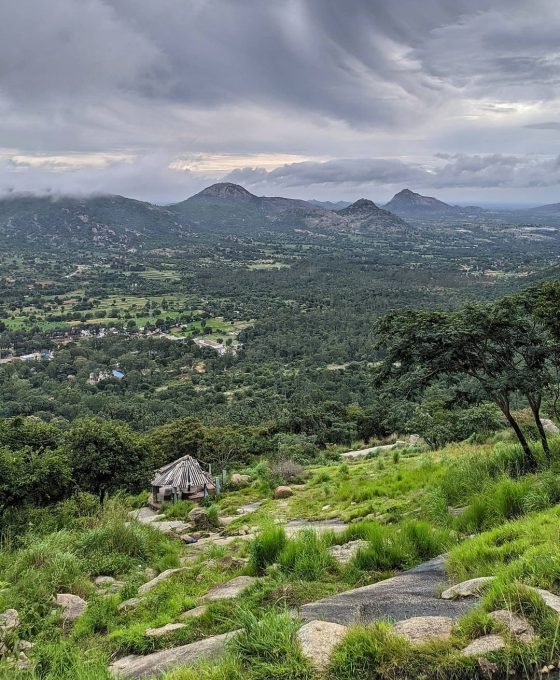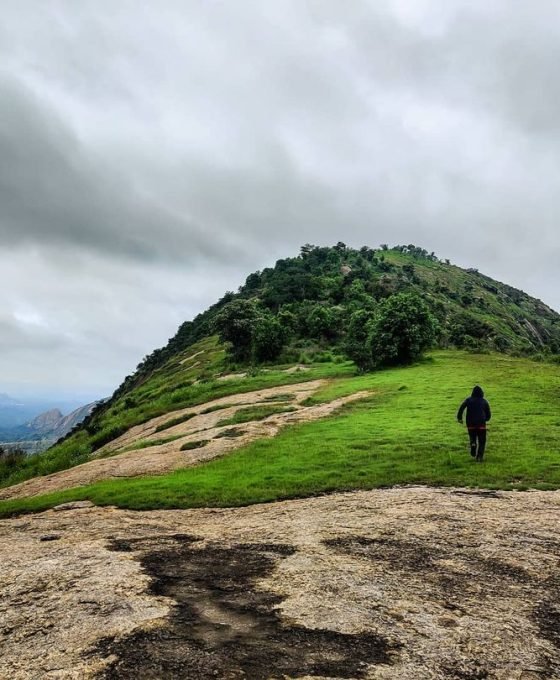Things to do in Bangalore

Trekking

Night Trek

Camping

Parties

One Day Trips

Two Days Trip

Adventure

Workshop

Trekking

Camping

One & Two Day Trips

Adventure & Parties
Unveiling Savandurga: A Hidden Gem in the Heart of Karnataka
Hey there, fellow adventure seekers! Have you ever heard of Savandurga? If not, buckle up because I will take you on a virtual journey to one of India’s most exciting and breathtaking spots. Nestled just a stone’s throw away from Bangalore, Savandurga is a haven for thrill-seekers and nature lovers. With its majestic hills, ancient temples, challenging treks, and serene lakes, Savandurga promises an unforgettable experience.
What is Savandurga?
Savandurga is a massive monolithic hill located around 60 kilometres west of Bangalore in the Indian state of Karnataka. It stands proudly at a height of 1,226 meters (4,036 feet) above sea level, making it one of Asia’s most enormous monolith hills. The name “Savandurga” is derived from the words “Savana,” meaning “three,” and “Durga,” meaning “fort,” referring to the three fortifications on the hill.
The Legend of Savandurga
Legend has it that Savandurga was once known as Savandi, a combination of two Kannada words, “Savana” (three) and “Durga” (fort). According to local folklore, the hill was once a stronghold of Kempe Gowda, the founder of Bangalore. It was later taken over by the Marathas and then by the British. The mountain is also believed to be the birthplace of the legendary Saint Savandi Veerabhadraswamy, adding a spiritual aura to this magnificent place.
Savandurga Hills: Nature's Masterpiece
When you first see the Savandurga Hills, you’ll be mesmerized by their sheer size and rugged beauty. The hills have two prominent peaks: Karigudda (Black Hill) and Biligudda (White Hill). Their contrasting colours create a striking visual spectacle that’s hard to forget.
Flora and Fauna
Discover the stunning Savandurga Hills, which are covered in lush green plants and home to various plants and animals. The hills are a haven for bird watchers, as they are home to many types of birds. You may spot exotic birds like the peregrine falcon or the yellow-throated bulbul. The vegetation here includes dry deciduous forests, scrublands, and patches of grassland, providing a diverse habitat for wildlife.
Savandurga Lake
At the base of the hills lies the serene Savandurga Lake, a perfect spot for relaxation after a tiring trek. Dense forests surround the lake and offer a tranquil boating and picnicking environment. Imagine sitting by the lake, watching the sunset, and soaking in the beauty of nature—pure bliss!
Savandurga Trek: An Adventurer's Dream
Savandurga is best known for its challenging trek, perfect for those seeking adventure. The trek to the hilltop is tough but highly rewarding, offering stunning views and a lasting sense of achievement.
Trekking Routes
There are two main trekking routes in Savandurga: the Karigudda (Black Hill) trail and the Biligudda (White Hill) trail. Every trail provides a unique experience and presents its own challenges.”
Karigudda (Black Hill) Trail
The Karigudda trail presents a more challenging trek, characterized by steep inclines and rocky terrain. This trail is best suited for experienced trekkers seeking an adventurous climb. Remember to prepare for a rewarding experience at the summit with stunning panoramic views of the landscape and a deep sense of achievement.
Biligudda (White Hill) Trail
The Biligudda trail, on the other hand, is relatively more accessible and more popular among trekkers. The trail is marked and has a gentler slope, making it suitable for beginners and families. Along the way, you’ll come across ancient ruins and cave temples, adding a touch of history to your adventure.
Trek Distance and Duration
The Savandurga trek covers approximately 4 kilometres one way. Depending on your pace and route, it can take 2 to 4 hours to complete. Remember to carry enough water, wear comfortable hiking shoes, and be prepared for a bit of a workout!
Entry Fee and Timings
Good news for budget travellers – there’s no entry fee for the Savandurga trek! The hills are open to trekkers from sunrise to sunset, so starting early in the morning is best to avoid the scorching heat and enjoy the cool morning breeze.
Narasimha Swamy Temple
The Narasimha Swamy Temple is believed to have been built during the Hoysala period and is a significant pilgrimage site for devotees. The temple architecture blends Dravidian and Hoysala styles, with intricate carvings and sculptures adorning its walls. The temple’s peaceful ambience and spiritual vibes make it a must-visit spot for anyone exploring Savandurga.
Temple Timings
The Narasimha Swamy Temple is open to visitors from 6:00 AM to 1:00 PM and 4:00 PM to 8:00 PM. Plan your visit accordingly to experience the temple’s divine aura and seek blessings.
Savandurga Fort: A Glimpse into History
Did you know that Savandurga was once a formidable fortress? The Savandurga Fort, also known as Savanadurga Betta, has a rich history that dates back to the 16th century.
Historical Significance
Kempe Gowda originally built the fort, which the Marathas later expanded. Due to its elevated position and natural defences, it served as a strategic military base. The British eventually captured the fort, marking the end of its military significance. Today, the fort’s ruins testify to its glorious past, offering a fascinating historical glimpse.
Exploring the Fort
Exploring the Savandurga Fort is like stepping back in time. As you wander through the ruins, you’ll come across ancient gateways, watchtowers, and remnants of the fort’s walls. The fort’s breathtaking views are a perfect spot for photography enthusiasts.
Things to Do in Savandurga
Savandurga has something for everyone, whether you’re an adventure enthusiast, a history buff, or a nature lover. Here are some of the top things to do in Savandurga:
Trekking and Rock Climbing
Of course, trekking and rock climbing are the main attractions in Savandurga. Challenge yourself with the Karigudda trail or enjoy a leisurely hike on the Biligudda trail. If you’re into rock climbing, the granite cliffs of Savandurga offer some thrilling climbs.
Visit the Narasimha Swamy Temple
Take some time to visit the Narasimha Swamy Temple and soak in the spiritual vibes. The temple’s serene surroundings and beautiful architecture make it a peaceful retreat.
Explore the Savandurga Fort
Delve into history by exploring the ruins of the Savandurga Fort. The fort’s strategic location and panoramic views make it a fascinating spot to explore.
Picnic by Savandurga Lake
After a tiring trek, head to Savandurga Lake for a relaxing picnic. The tranquil waters and lush greenery provide the perfect backdrop for a leisurely afternoon.
Bird Watching
If you’re a bird enthusiast, remember to bring your binoculars. Savandurga is home to several species of birds, making it a paradise for bird watchers.
Camping
For an unforgettable experience, consider camping overnight at Savandurga. Set up your tent under the starry sky, enjoy a bonfire, and wake up to the sounds of nature.
Boating
You can also enjoy boating at Savandurga Lake. Rent a boat and paddle around the calm waters, taking in the serene surroundings.
Best Time to Visit Savandurga
The best time to visit Savandurga is during the cooler months, from October to March. The weather is pleasant during this period, making it ideal for trekking and outdoor activities. Avoid visiting during the monsoon season (June to September), as the trails can be slippery and dangerous.
How to Reach Savandurga
Getting to Savandurga is relatively easy, thanks to its proximity to Bangalore. Here are a few options:
By Car
The most convenient way to reach Savandurga is by car. The drive from Bangalore takes 1.5 to 2 hours, depending on traffic. The Magadi Road route offers scenic views along the way.
By Bus
You can take a bus from Bangalore to Savandurga if you prefer public transportation. Several buses operate between Bangalore and Magadi, from where you can hire a local cab or auto-rickshaw to reach Savandurga.
Bus Timings
The Bangalore to Savandurga bus timings vary, so it’s best to check with the local bus station for the latest schedule. Buses generally start early in the morning and run until late evening.
By Train
There are no direct train services to Savandurga. The nearest railway station is Bangalore, where you can hire a cab or take a bus to Savandurga.
Places Near Savandurga
If you have some extra time, consider exploring these nearby attractions:
Manchanabele Dam
Located about 10 kilometres from Savandurga, Manchanabele Dam is famous for picnics and water sports. The dam offers stunning views of the surrounding hills and is a great place to unwind.
Dodda Alada Mara (Big Banyan Tree)
Just a short drive from Savandurga, the Dodda Alada Mara is a 400-year-old banyan tree covering over 3 acres. It’s a unique natural wonder worth a visit.
Magadi
Magadi, a historic town about 20 kilometres from Savandurga, is known for its ancient temples and scenic beauty. Visit the Ranganathaswamy Temple and enjoy a stroll through the city.
Conclusion
Savandurga is a treasure trove of natural beauty, adventure, and spirituality. Whether you’re an avid trekker, a history enthusiast, or someone seeking a peaceful retreat, Savandurga has something to offer. So, what are you waiting for? Pack your bags, gather your friends, and embark on an unforgettable journey to Savandurga. Trust me, it’s an experience you’ll cherish for a lifetime. Happy exploring!
Frequently Asked Question
Q: Is Savandurga closed?
A: Savandurga is generally open to visitors throughout the year. However, it is advisable to check for any temporary closures or restrictions before planning your visit, especially during the monsoon season or due to local events.
Q: How to reach Savandurga from Bangalore?
A: Savandurga is located about 60 kilometers west of Bangalore. You can reach Savandurga from Bangalore by car, which takes around 1.5 to 2 hours via Magadi Road. Alternatively, you can take a bus from Bangalore to Magadi and then hire a local cab or auto-rickshaw to reach Savandurga.
Q: How to reach Savandurga from Bangalore by bus?
A: To reach Savandurga from Bangalore by bus, you can take a bus to Magadi from Bangalore’s central bus stations such as Majestic or KR Market. From Magadi, you can hire a local cab or auto-rickshaw to reach Savandurga.
Q: Where is Savandurga located?
A: Savandurga is located in the Indian state of Karnataka, approximately 60 kilometers west of Bangalore.
Q: Can I go to Savandurga by myself?
A: Yes, you can visit Savandurga by yourself. The trek trails are well-marked, and many solo travelers visit the hills. Just make sure to carry sufficient water, wear comfortable shoes, and take necessary precautions.
Q: Can Savandurga Hills be visited by the elderly?
A: The Savandurga trek can be quite challenging due to its steep and rocky terrain, so it may not be suitable for elderly individuals with mobility issues. However, the base areas and the Narasimha Swamy Temple at the foothills can be visited more comfortably.
Q: How old is Savandurga Temple?
A: The Narasimha Swamy Temple at Savandurga is believed to date back to the Hoysala period, making it several centuries old.
Q: How to reach Savandurga?
A: Savandurga can be reached by car from Bangalore via Magadi Road, which takes around 1.5 to 2 hours. You can also take a bus to Magadi and then hire a local cab or auto-rickshaw to reach Savandurga.
Q: How to reach Savandurga Fort?
A: To reach Savandurga Fort, you need to trek up the Savandurga Hills. The fort is located at the top of the hill, and you can choose either the Karigudda (Black Hill) trail or the Biligudda (White Hill) trail to reach it.
Q: How to take permission for Savandurga trek?
A: As of now, no special permission is required for the Savandurga trek. However, it is always a good idea to check for any local regulations or updates before your visit.
Q: Is night trek allowed in Savandurga?
A: Night trekking is not officially allowed in Savandurga due to safety concerns. It is recommended to start your trek early in the morning and complete it during daylight hours.
Q: Is Savandurga safe?
A: Savandurga is generally safe for visitors. However, it’s important to take standard precautions, such as carrying sufficient water, wearing appropriate footwear, and avoiding trekking alone after dark.
Q: What is the height of Savandurga Hill?
A: Savandurga Hill stands at a height of 1,226 meters (4,036 feet) above sea level.
Q: What to buy near Savandurga?
A: There are no major shopping areas near Savandurga, but you can buy local snacks, fresh fruits, and small souvenirs from local vendors near the base of the hills.
Q: Where is Savandurga?
A: Savandurga is located in Karnataka, India, approximately 60 kilometers west of Bangalore.
Q: Which river passes from Savandurga?
A: The Arkavathi River passes near the Savandurga Hills.
Q: Who built the Sri Narasimha Lakshmi Temple in Savandurga Hill?
A: The Sri Narasimha Lakshmi Temple at Savandurga is believed to have been built during the Hoysala period.
Q: Why the name Savandurga?
A: The name “Savandurga” is derived from the words “Savana” (three) and “Durga” (fort), referring to the three fortifications on the hill.
Picks By Erica
Makalidurga Trek
Siddara Betta Trek
Handi Gundi Betta
- Skandagiri Trek
- Kumara Parvatha Trek
- Uttari Betta Trek
- Makalidurga Trek
- Tadiandamol Trek
- Ettina Bhuja Trek
- Nandi Hills Trek
- Mullayanagiri Trek
- Kunti Betta Trek
- Devarayanadurga Trek
- Madhugiri Trek
- Narasimha Parvatha Trek
- Pushpagiri Trek
- Kurinjal Trek
- Ombattu Gudda Trek
- Kabbaladurga Trek
- Siddara Betta Trek
- Bheemeshwari Trek
- Bandaje Arbi Falls Trek
- Jenukal Gudda Trek
- Bababudangiri Trek
- Ranganathaswamy Betta Trek
- Kumta Beach Trek
- Bananthimari Betta Trek
- Netravathi Trek
- Bidarakatte Trek
- Kote Betta Trek
- Rayakottai Trek
- Sharavathi Valley Trek
- Savandurga Trek
- Anthargange Trek
- Nishani Motte Trek
- Kodachadri Trek
- Kudremukh Trekking Adventure
- Nirvana Beach Camping
- Handi Gundi Betta Trek
- Sathodi Falls Karnataka
- Channagiri Betta Trek
- Gudibande Fort Trek
- Dudhsagar Falls Trek
- Bandaje Trek
- Kumaraparvata Trekking
- Ravugodlu Trek
- Mandalpatti Trek
- Z Point Trek
- Agumbe
- Ettina Bhuja
- Savandurga
- Shivagange
- Dudhsagar Falls
- Dudhsagar Falls
- Kodachadri
- Sirimane Falls
- Iruppu Falls
- Rayakottai
- Banasura Hill
- Netrani Island
- Netravati Peak
- Mullayanagiri
- Gokarna
- Dandeli
- Chikkamagaluru
- Coorg
- Bangalore
- Kemmangundi
- Karnataka India
- Mysore
- Sakleshpur
- Kotagiri
- Kollur
- Kumta
- Yana
- Devarayanadurga
- Hampi
- Mandalpatti Peak
- Madhugiri Hill
- Avani Betta
- Didupe
- Kumara Parvatha
- Shimoga
- Ermayi Falls
- Manchabele Reservoir
- Bheemeshwari
- Kaiwara
- Kodaikanal Falls
- Murkannu Gudda
- Surla Waterfalls
- Kavaledurga Fort
- Kemmangundi
- Magod Falls
- Jog Falls
- Kanva Dam
- Pandavara Betta
- Ramadevara Betta
- Bhuvanagari Fort
- Athirapally Waterfalls
- Muthati
- Kunthi Hills
- Cubbon Park
- Bannerghatta Biological Park
- Innovative Film City
- Bull Temple
- Murudeshwar
- Markonahalli Dam
- Janapada Loka
- Mallalli Falls
- Devaramane Viewpoint
- Kalasa
- Nagarhole National Park
- Talakadu
- Gangadikal Peak
- Chunchi Falls
- Channagiri Hills
- Horagina Betta
- Kyatanamakki
- Bheemana Kindi
- Muregar Falls
- Devimane Ghat
- Gudavi Bird Sanctuary
- Agni Gudda
- Kurinjal Peak
- Apsarakonda Falls
- Belur And Halebidu
- Soormane Falls
- Srirangapatna Temple
- Hampi Trek
- Dandeli Falls
- Wayanad Trek
- Chikmagalur Hills
- Agumbe Falls
- Paithalmala
- Bangalore Palace
- Mashobra Hills
- Night Camping
- Kaveri Nisargadhama
- Unchalli Falls
- Sakleshpur Falls
- Chikmagalur Trekking Places
- Kaginahare
- Rani Jhari
- Abbey Falls
- Kudremukh National Park
- Bannerghatta National Park
- Nijagal Betta
- Madikeri Fort
- Hidlumane Falls
- Iruppu Falls
- Belkal Theertha Falls
- Devarayanadurga Betta
- Gopalaswamy Betta
- Devarayanadurga Fort
- Hebbe Waterfalls
- Kid Friendly Places Near Bangalore
- Camping Near Bangalore
- Two Day Trip From Bangalore
- Weekend Outing In Bangalore
- Trekking Near Bangalore
- One Day Trip Near Bangalore
- Parties In Bangalore
- Trekking Packages
- Night Trek Bangalore
- Treks Near Bangalore
- Night Trekking In Bangalore
- Weekend Getaways From Bangalore
- Bangalore To Coorg Package
- Best Tourist Places In Kerala
- Team Outing Near Bangalore
- One-Day Road Trips From Bangalore By Car
- Ettina Bhuja Distance From Bangalore
- Hill Stations Near Banaglore
- One Day Trek
- Trekking Near Myosre
- Waterfalls Near Bangalore
- Picnic Spots Near Bangalore
- Top Tourist Places In Bangalore
- Trekking In Bangalore
- Chikmagalur Trekking Packages
- Bangalore To Hampi Distance
- New Year Events In Bangalore
- Sunrise Trek Near Bangalore
- Places To Visit In Madikeri In 2 Days
- Go Karting In Bangalore
- Trampoline Park Bangalore
- Best Street Food In Bangalore
- Places To Visit In Tumkur
- Agumbe Tourist Places
- Best Beach In Gokarna
- Kanakapura Waterfalls
- Sunrise At Nandi Hills
- Uttari Betta Trek Location
- Bangalore To Gokarna
- Bangalore To Coorg
- Bangalore To Ooty
- Nandi Hills Tent Stay
- Dandeli Trekking
- Murudeshwar Sightseeing
- Waterfalls In Udupi
- Solo Travel
- Adventure
- Beautiful Places To Visit In India
- Kolukkumalai Sunrise
- Mysore Trip
- Coorg Waterfalls
- Chikmagalur Hill
- White Hills Bangalore
- Sholay Shooting Hill Top
- Activities To Do In Bangalore
- Night Camping
- Hills In Bangalore
- Places To Visit Near Adiyogi
- Trekking In Karnataka
- Agumbe Ghat
- Famous Places In Karnataka
- Highest Peak In Karnataka
- Hill Stations Near Bangalore
- Historical Places In Karnataka
- Bandipur Safari Timings
- Beaches Near Bangalore
- Chikmagalur Tourist Places
- Coorg Trekking
- Famous Temples In Bangalore
- Fun Activities In Bangalore
- Gokarna Main Beach
- Gokarna Trip
- Historical Places In Bangalore
- Picnic Spots In Bangalore
- Places Around Bangalore
- Places In Gokarna
- Places To Visit In Bangalore With Family
- Places To Visit In Chikmagalur
- Places To Visit In Gokarna
- Places To Visit In Honnavar
- Places To Visit In Shimoga
- Rock Climbing In Bangalore
- Sakleshpur Places
- Sakleshpur Tourist Places
- Sakleshpur Trek
- Shimoga Places To Visit
- National Parks In Karnataka
- Tourist Places In Karnataka
- Tourist Places Near Bangalore Within 100 Kms
- Traditional Food Of Karnataka
- Treks In Karnataka
- Sirsi Karnataka
- Coorg Falls
- Kunti Betta From Bangalore
- Kunti Betta Trek Distance
- Nature Places In Bangalore
- Mysore Tourist Places
- Muthanga Wildlife Safari
- Cities In Karnataka
- Coastal Karnataka
- Devarayanadurga Distance
- Places To Visit In Chikmagalur In 2 Days
- Places To Visit In Hassan
- Sangam Waterfalls
- Sangam Waterfalls
- Savandurga Trek Distance
- Skandagiri Trek Start Point
- Kodaikanal Tourist Places
- Bangalore To Munnar
- Bangalore To Hampi
- Bangalore To Coorg Distance
- Banglore To Ooty
- Bangalore To Sakleshpur
- Bangalore To Hogenakkal
- How To Reach Coorg
- Bangalore To Shivanasamudra
- Bangalore To Mysore
- Bangalore To Kodaikanal
- Bangalore To Kudremukh
- Bangalore To Chikmagalur Distance
- Bangalore To Shimoga
- Frequently Asked Questions - Munnar
- Frequently Asked Questions - Ooty
- Frequently Asked Questions - Dudhsagar
- Frequently Asked Questions - Dandeli
- Frequently Asked Questions - Chikmagalur
- Frequently Asked Questions - Coorg
- Frequently Asked Questions - Mysore
- Frequently Asked Questions - Alleppey
- Frequently Asked Questions - Bangalore
- Frequently Asked Questions - Bangalore
Host Events
Collaboration
Copyright © 2024 EventsErica





